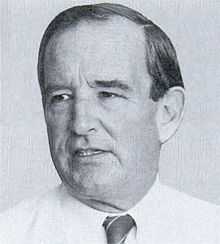Stewart McKinney (politician)
| Stewart McKinney | |
|---|---|
 | |
| Member of the U.S. House of Representatives from Connecticut's 4th district | |
| In office January 3, 1971 – May 7, 1987 | |
| Preceded by | Lowell P. Weicker, Jr. |
| Succeeded by | Christopher Shays |
| Personal details | |
| Born | January 30, 1931 Pittsburgh, Pennsylvania |
| Died | May 7, 1987 (aged 56) Washington, D.C. |
| Political party | Republican |
| Spouse(s) | Lucie Cunningham |
| Children | John P. McKinney |
| Alma mater | Yale University |
Stewart Brett McKinney (January 30, 1931 – May 7, 1987) was an American politician who represented the Fourth congressional district of Connecticut in the House of Representatives from 1971 until his death.
Life and Politics
McKinney was born in Pittsburgh, Pennsylvania, but by the time he graduated from high school, his family was living in Connecticut, where he would live for the rest of his life. He attended Kent School and later Princeton University from 1949 to 1951, but dropped out and enlisted in the United States Air Force, attaining the rank of sergeant. After leaving the Air Force in 1955, he went back to college, receiving a B.A. from Yale University in 1958.
In 1966, McKinney was elected as a Republican to the Connecticut State House of Representatives, where he served two 2-year terms, including a stint as minority leader in his second term (1969–1970).
McKinney married Lucie Cunningham, the daughter of Briggs Cunningham II and Lucie Bedford, the granddaughter of a co-founder of Standard Oil.
In 1970, McKinney ran for the U.S. House and won. He served in the House as a moderate Republican until his death in Washington, DC. He is widely known for the McKinney-Vento Homeless Assistance Act of 1986, which provides federal money for shelter programs. McKinney served on the Banking, Finance and Urban Affairs Committee[1] and is credited with coining the phrase "too big to fail" in connection with large banks.[2] In Congress, he served on the House Select Committee on Assassinations. During this time, he also served as a director of Bridgeport Hospital.
McKinney was a resident of Greens Farms, which is a part of Westport, Connecticut.
His death in 1987 was brought about by complications of AIDS. His physician speculated he became infected with HIV in 1979 from blood transfusions during heart surgery, although the odds of that may have been about 10,000 to 1.[3] McKinney was actively though not openly bisexual.[3][4] Antigay prejudice at the time of McKinney's death in 1987 may have promoted a disingenuous approach to speculations on the cause of McKinney's HIV infection.
He was the first U.S. congressman to die of the disease. After his death, Congress renamed the Salt Meadow National Wildlife Refuge in Connecticut the Stewart B. McKinney National Wildlife Refuge.
His son John McKinney is now the State Senator from Fairfield where he is minority leader of the Connecticut State Senate and is a candidate for Governor in 2014.
References
- ↑ Stewart B. McKinney Finding Aid, Special Collections Research Center, Estelle and Melvin Gelman Library, The George Washington University
- ↑ Dash, Eric (2009-06-20). "If It’s Too Big to Fail, Is It Too Big to Exist?". New York Times. Retrieved 2009-06-22.
- ↑ 3.0 3.1 May, Clifford, D. Friends Say McKinney Had Homosexual Sex May 9, 1987 New York Times
- ↑ Tapper, Jake A Brief History Of Gays In Government 2008 ABC News Internet Ventures
External links
- Stewart McKinney (politician) at the Biographical Directory of the United States Congress
- Wall Street Journal Obituary as republished by Ben Gardiner
- Virtual AIDS Quilt Obituary
| United States House of Representatives | ||
|---|---|---|
| Preceded by Lowell P. Weicker, Jr. |
Member of the U.S. House of Representatives from Connecticut's 4th congressional district January 3, 1971 – May 7, 1987 |
Succeeded by Christopher Shays |
|